PHUKET: Thirty-six Rohingya escaped from Phuket Immigration cells at the Phuket City headquarters early today and 32 remain free this evening, according to sources.
The men broke to freedom through a hole in the roof, Phuketwan was told. Phuket Immigration officials were not available to provide confiirmation.
Two Rohingya men who were unable to walk remained in the Immigration cells as their friends clambered out into the dark about 3am, the sources said.
Two men were recaptured at Kaset market, near Robinson Department Store in Phuket Town, about 9am. Two more were arrested at 1pm near the mosque on Taling Chan Road, off the Clocktower Circle.*
The Phuket breakout follows a determined protest involving 261 Rohingya at the immigration centre in Phang Nga, north of Phuket, on Thursday and the escape of 30 Rohingya from Sadao Immigration, in the province of Songkhla, early on Friday.
Police and Immigation officials are being stretched to deal with the role of reluctant prison wardens as the Thai Government remains silent about potential solutions.
The Rohingya protests and escapes come in a week in which people trafficking in Thailand returned to the headlines with the exposure of a secret series of traffickers' hideaway camps on a holiday island off southern Thailand and the capture of one suspected trafficker.
The Army's Internal Security Operations Command has also been involved in pursuing traffickers.
A Rohingya translator was arrested at her Phang Nga home in a raid early on Friday morning and taken to a local police station for questioning.
During the interrogation, the woman was shown a photograph of a Phuketwan reporter and questioned about whether the reporter could be a trafficker, sources said.
The reporter had been photographed at the Phang Nga immigration protest on Thursday.
While concerns that the Rohingya may have had outside aid in staging the protest cannot be discounted, no assistance was provided by Phuketwan.
The men who escaped from Phuket Immigration today are familiar to us, though. They were among the group of 96 Rohingya men, women and children apprehended off Phuket on March 23.
The group landed at Koh Lon, where we met them and discovered with the help of a translator that they were among more than 200 boatpeople in three vessels.
The three boats had been held by Indian authorities for 40 days then released, with extra provisions, from the Andaman and Nicobar Islands on March 19.
Eleven other Rohingya were captured in Vichit, south of Phuket City.
A second boat carrying 39 Rohingya was apprehended north of Phuket but nothing was heard from the third boat, containing 69 people. It may have sank.
The Rohingya now free on Phuket are among about 2000 who were being held in Thailand while the government decides what to do with them.
Most have been held since January, when authorities gave themselves six months to decide on the Rohingyas' status and future. That deadline passed two weeks ago and the Rohingya, who had hoped to be in Malaysia in just a few days, now appear likely to be held indefinitely.
They cannot go back to Burma, where most fear certain death in a wave of ethnic cleansing that has the tacit backing of the Burmese government.
Trafficked in Thailand with the help of renegade members of the military or police, some face sale as slaves on fishing trawlers.
A reporter with Britain's Channel exposed the secret camps on Thailand's Tarutao island this week.
Rohingya say they are transported to the island with women and children held in cages just below main deck, according to Channel 4.
The men squeeze into false decks, like large wooden shelves, built into the hull. The traffickers want money and organise telephone calls to each captives' family.
''If friends and relatives are unwilling - or unable to pay, Rohingya are beaten - often with their relatives listening on the line,'' the report said.
''[Rohingya] Rafeeq told us about his experience in floods of tears: 'They lined us up and gave us the phone and told us to call them. They demand the money and beat us up. They beat us continually until they get the cash.'
''Mohammad [another Rohingya] said he witnessed beatings every single day he was held prisoner. Mohammed told us that prisoners who can't pay the ransom are sold as slave labor to Thai fishing boats.''
Reuters news agency later reported that Thailand's Department of Special Investigation and local police captured the suspected leader of a human trafficking gang in the province of Surat Thani.
Forty-two-year-old Ko Myo, from Burma (Myanmar) confessed to selling some migrants into slavery on Thai fishing boats and is suspected of possibly murdering as many as seven people.
Earlier this year, all the Rohingya women and children being held at a family shelter on Phuket escaped, probably with the help of traffickers.
Others have fled the family shelter in Phang Nga, where a local policeman has been accused of involvement.
The Rohingya who staged a protest at the Phang Nga Immigration centre on Thursday trashed their cells and were transferred in groups to smaller local police stations.
*We had the circle wrong in earlier publication.
The men broke to freedom through a hole in the roof, Phuketwan was told. Phuket Immigration officials were not available to provide confiirmation.
Two Rohingya men who were unable to walk remained in the Immigration cells as their friends clambered out into the dark about 3am, the sources said.
Two men were recaptured at Kaset market, near Robinson Department Store in Phuket Town, about 9am. Two more were arrested at 1pm near the mosque on Taling Chan Road, off the Clocktower Circle.*
The Phuket breakout follows a determined protest involving 261 Rohingya at the immigration centre in Phang Nga, north of Phuket, on Thursday and the escape of 30 Rohingya from Sadao Immigration, in the province of Songkhla, early on Friday.
Police and Immigation officials are being stretched to deal with the role of reluctant prison wardens as the Thai Government remains silent about potential solutions.
The Rohingya protests and escapes come in a week in which people trafficking in Thailand returned to the headlines with the exposure of a secret series of traffickers' hideaway camps on a holiday island off southern Thailand and the capture of one suspected trafficker.
The Army's Internal Security Operations Command has also been involved in pursuing traffickers.
A Rohingya translator was arrested at her Phang Nga home in a raid early on Friday morning and taken to a local police station for questioning.
During the interrogation, the woman was shown a photograph of a Phuketwan reporter and questioned about whether the reporter could be a trafficker, sources said.
The reporter had been photographed at the Phang Nga immigration protest on Thursday.
While concerns that the Rohingya may have had outside aid in staging the protest cannot be discounted, no assistance was provided by Phuketwan.
The men who escaped from Phuket Immigration today are familiar to us, though. They were among the group of 96 Rohingya men, women and children apprehended off Phuket on March 23.
The group landed at Koh Lon, where we met them and discovered with the help of a translator that they were among more than 200 boatpeople in three vessels.
The three boats had been held by Indian authorities for 40 days then released, with extra provisions, from the Andaman and Nicobar Islands on March 19.
Eleven other Rohingya were captured in Vichit, south of Phuket City.
A second boat carrying 39 Rohingya was apprehended north of Phuket but nothing was heard from the third boat, containing 69 people. It may have sank.
The Rohingya now free on Phuket are among about 2000 who were being held in Thailand while the government decides what to do with them.
Most have been held since January, when authorities gave themselves six months to decide on the Rohingyas' status and future. That deadline passed two weeks ago and the Rohingya, who had hoped to be in Malaysia in just a few days, now appear likely to be held indefinitely.
They cannot go back to Burma, where most fear certain death in a wave of ethnic cleansing that has the tacit backing of the Burmese government.
Trafficked in Thailand with the help of renegade members of the military or police, some face sale as slaves on fishing trawlers.
A reporter with Britain's Channel exposed the secret camps on Thailand's Tarutao island this week.
Rohingya say they are transported to the island with women and children held in cages just below main deck, according to Channel 4.
The men squeeze into false decks, like large wooden shelves, built into the hull. The traffickers want money and organise telephone calls to each captives' family.
''If friends and relatives are unwilling - or unable to pay, Rohingya are beaten - often with their relatives listening on the line,'' the report said.
''[Rohingya] Rafeeq told us about his experience in floods of tears: 'They lined us up and gave us the phone and told us to call them. They demand the money and beat us up. They beat us continually until they get the cash.'
''Mohammad [another Rohingya] said he witnessed beatings every single day he was held prisoner. Mohammed told us that prisoners who can't pay the ransom are sold as slave labor to Thai fishing boats.''
Reuters news agency later reported that Thailand's Department of Special Investigation and local police captured the suspected leader of a human trafficking gang in the province of Surat Thani.
Forty-two-year-old Ko Myo, from Burma (Myanmar) confessed to selling some migrants into slavery on Thai fishing boats and is suspected of possibly murdering as many as seven people.
Earlier this year, all the Rohingya women and children being held at a family shelter on Phuket escaped, probably with the help of traffickers.
Others have fled the family shelter in Phang Nga, where a local policeman has been accused of involvement.
The Rohingya who staged a protest at the Phang Nga Immigration centre on Thursday trashed their cells and were transferred in groups to smaller local police stations.
*We had the circle wrong in earlier publication.

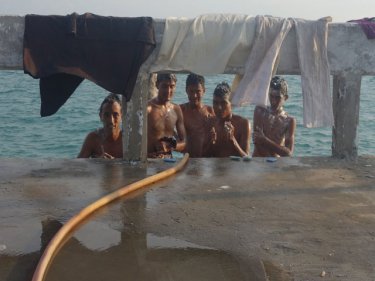





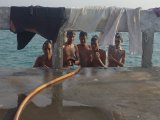
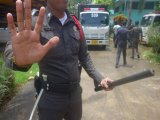
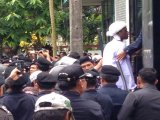
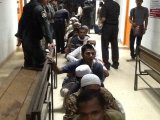

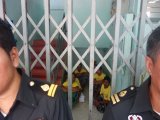

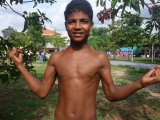
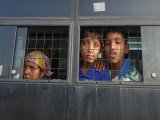
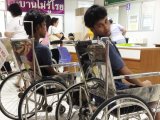

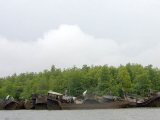
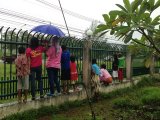

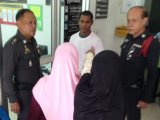

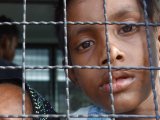
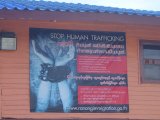
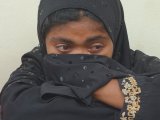

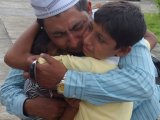

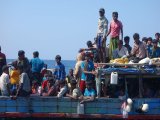
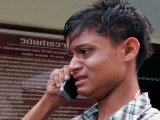

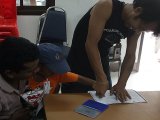
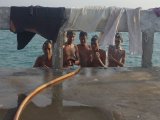
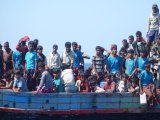
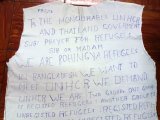
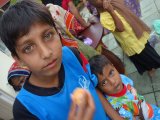
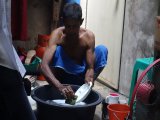
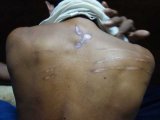
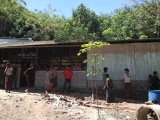
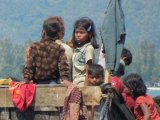

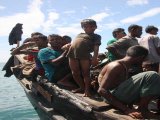
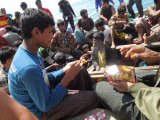



Let the hunt begin!
Posted by Noa on August 10, 2013 22:13